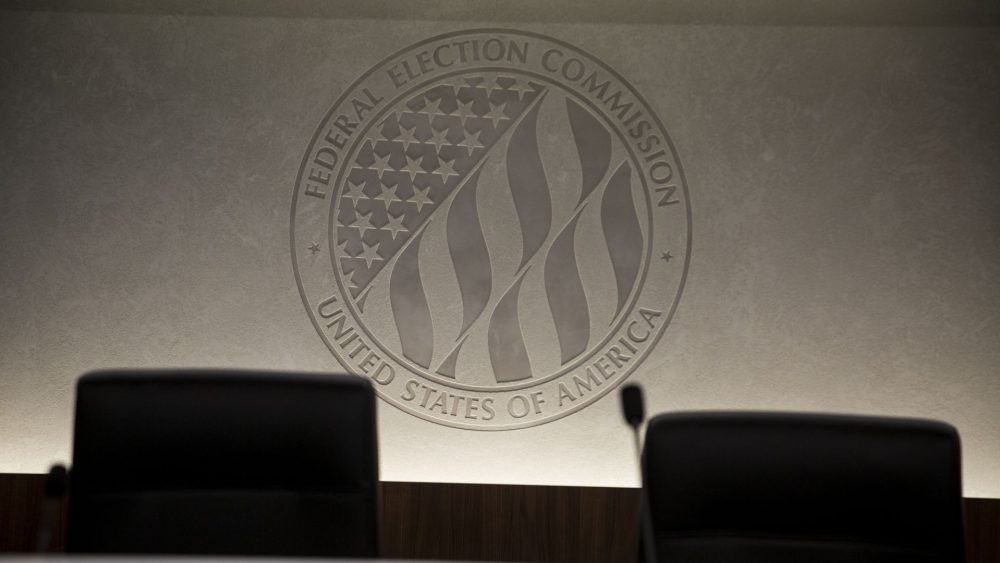January 8, 2021 •
Federal Contribution Limits Increased in Canada

Elections Canada has published the federal contribution limits for the 2021 calendar year. In 2021, individuals may contribute up to $1,650 to independent candidates, leadership candidates, registered parties, and to, in total, all of the registered associations, nomination contestants and […]
Elections Canada has published the federal contribution limits for the 2021 calendar year.
In 2021, individuals may contribute up to $1,650 to independent candidates, leadership candidates, registered parties, and to, in total, all of the registered associations, nomination contestants and candidates of each registered party.
The limits also apply to any unpaid balance of loans made during a contribution period and the amount of any loan guarantees made during a contribution period.
The limits increase annually by $25 on January 1.
January 4, 2021 •
US Congress Starts New Session
On January 3, the United States House of Representatives began the first session of the 117th Congress. Rep. Nancy Pelosi won her fourth election as speaker of the House by 216 votes to 209 votes. Of the 435 seats in […]
On January 3, the United States House of Representatives began the first session of the 117th Congress.
Rep. Nancy Pelosi won her fourth election as speaker of the House by 216 votes to 209 votes. Of the 435 seats in the House, the Democrats lead with a slim majority of 222 seats.
Pelosi stated the lawmakers’ “most urgent priority will continue to be defeating the coronavirus,” according to the New York Times.
The U.S. Senate also officially met in a pro forma session to begin its two-year period of legislative business. On January 5, the Georgia election for its two U.S. Senators will decide which party controls the Senate.
December 23, 2020 •
New FEC Chair and Vice Chair for 2021

FEC; Photo: Sarah Silbiger/CQ Roll Call
On December 22, the Federal Election Commission (FEC) announced the election of Shana M. Broussard as its chairwoman for 2021. Additionally, Allen Dickerson was elected as vice chair for next year. Both Broussard and Dickerson, along with Sean Cooksey, were […]
On December 22, the Federal Election Commission (FEC) announced the election of Shana M. Broussard as its chairwoman for 2021.
Additionally, Allen Dickerson was elected as vice chair for next year.
Both Broussard and Dickerson, along with Sean Cooksey, were all confirmed by the U.S. Senate on December 9.
By confirming three new commissioners, the FEC, where only three of the agency’s six seats had been filled since July 4, are now able to conduct official business.
Federal law requires at least four commissioners agree on any official action. The positions of chair and vice chair are rotating, one-year positions.
December 18, 2020 •
Quebec to Update Lobbyist Registry Disclosure Platform

The year 2021 will likely bring major changes to the Quebec Lobbyists Registry online lobbying activity disclosure platform. In the works since the summer of 2019, the updated web platform aims to replace the “technological obsolescence” of the current site […]
The year 2021 will likely bring major changes to the Quebec Lobbyists Registry online lobbying activity disclosure platform.
In the works since the summer of 2019, the updated web platform aims to replace the “technological obsolescence” of the current site with a modern system, to improve the user experience, and to be in line with Quebec’s 2019-2023 digital transformation strategy, according to Lobbyists Commissioner Jean-Francois Routhier.
“The modernization of the lobbyists registry is without a doubt one of the biggest projects of our institution since its creation in 2002,” Routhier stated in his December 2020 newsletter.
A user committee made up of lobbyists, public office holders, journalists, and citizens has been testing a model of the new website to validate its user-friendliness and processes.
The commissioner has emphasized that the new website’s intuitive design, simplified process for registration, and increased capacity of searching for relevant information, are of interest to both lobbyists and the public.
Routhier says the new platform will replace the current Lobbyists Registry platform at the end of 2021.
December 10, 2020 •
Update to Canadian Federal Lobbyists’ Code of Conduct Being Considered
The Commissioner of Lobbying is concluding a public input period to determine whether changes to the Lobbyists’ Code of Conduct are necessary. From November 2 to December 11, 2020, Commissioner Nancy Belanger sought input from the public about its views […]
The Commissioner of Lobbying is concluding a public input period to determine whether changes to the Lobbyists’ Code of Conduct are necessary.
From November 2 to December 11, 2020, Commissioner Nancy Belanger sought input from the public about its views and perspectives on the standards of behavior federal lobbyists should follow.
The Lobbyists Code of Conduct, which is a mandatory set of rules all registered consultant and in-house federal lobbyists must follow, was last amended in 2015.
The rules, while general in scope, include a focus on transparency, professionalism, and conflicts of interest. After input is received, the commissioner intends to create a summary of the responses and draft any amendments to the Code of Conduct. Any updated code will be referred to the House of Commons Standing Committee on Access to Information, Privacy and Ethics.
Depending on the degree of change contemplated by the commissioner, a further round of consultation may be initiated in 2021.
December 9, 2020 •
US Senate Confirms Three New Commissioners to the FEC
On December 9, the U.S. Senate restored a full complement of commissioners to the Federal Election Commission (FEC). By confirming three new commissioners, the FEC, where only three of the agency’s six seats were filled since July 4, will now […]
On December 9, the U.S. Senate restored a full complement of commissioners to the Federal Election Commission (FEC).
By confirming three new commissioners, the FEC, where only three of the agency’s six seats were filled since July 4, will now be able to conduct official business. The FEC requires at least four commissioners to agree on any official action.
The Senate confirmed one Democrat, Shana Broussard, and two Republicans, Sean Cooksey and Allen Dickerson. No more than three members of the FEC may be registered with the same political party.
The remaining FEC commissioners are Chair James E. “Trey” Trainor III, a Republican, Ellen L. Weintraub, a Democrat, and Steven T. Walther, an Independent.
December 2, 2020 •
Fossil Fuel Companies Won’t Be Powering Biden’s Inauguration
President-elect Joe Biden’s newly formed inauguration committee will not be accepting contributions from registered federal lobbyists, foreign agents registered under the Foreign Agent Registration Act, or from fossil fuel companies, their executives, or PACs organized by them. The Biden Inaugural […]
President-elect Joe Biden’s newly formed inauguration committee will not be accepting contributions from registered federal lobbyists, foreign agents registered under the Foreign Agent Registration Act, or from fossil fuel companies, their executives, or PACs organized by them.
The Biden Inaugural Committee, a 501(c)(4) non-profit entity named PIC 2021, Inc., will still accept contributions from American corporate entities and associations to fund the celebratory events of the January 20, 2021 inauguration.
The contributions, which are not tax deductible as charitable contributions for federal income tax purposes, will also be accepted from labor organizations, U.S. citizens, and lawfully admitted permanent residents.
An inaugural committee is responsible for activities connected with the inaugural ceremony, except for the swearing-in ceremony at the Capitol and a luncheon honoring the president and vice president.
Contributions to an inaugural committee are not subject to any contribution limits.
November 4, 2020 •
Elections Held for Seats on the Council of the District of Columbia
On November 3, four of the ward seats for the Council of the District of Columbia City were up for election. Incumbent Trayon White won re-election for Washington D.C. City Council Ward 8. Meanwhile, incumbent Vincent Gray retained his seat […]
On November 3, four of the ward seats for the Council of the District of Columbia City were up for election.
Incumbent Trayon White won re-election for Washington D.C. City Council Ward 8.
Meanwhile, incumbent Vincent Gray retained his seat in the general election for the Ward 7 seat in the City Council.
Janeese Lewis George, who describes herself as a democratic socialist, won the City Council Ward 4 seat.
Incumbent Brooke Pinto, who won a special election in June, kept City Council Ward 2 position by winning the November 3 election.
Additionally, Robert White of the Democratic Party won an at-large seat with the council.
November 4, 2020 •
Owolewa Elected as D.C.’s Shadow Representative
Oye Owolewa won election as the District of Columbia’s Shadow Representative. Unlike the District’s non-voting Delegate to the House, the Shadow Representative is not able to vote in both floor votes and committee votes and is not recognized as an […]
Oye Owolewa won election as the District of Columbia’s Shadow Representative.
Unlike the District’s non-voting Delegate to the House, the Shadow Representative is not able to vote in both floor votes and committee votes and is not recognized as an actual member of the U.S. House of Representatives.
Along with Owolewa’s goal to achieve statehood for the District, the underlying goal of all shadow representatives, he has expressed an objective of ending federal taxes for the District until it achieves full political representation.
Franklin Garcia, currently serving in the position, did not seek reelection.
November 4, 2020 •
Strauss Reelected as D.C.’s Shadow Senator
Paul Eric Strauss was re-elected as the senior U.S. shadow Senator for the District of Columbia. The junior U.S. shadow Senator for the District is Mike Brown. While not officially sworn in or seated with the U.S. Senate, the main […]
Paul Eric Strauss was re-elected as the senior U.S. shadow Senator for the District of Columbia.
The junior U.S. shadow Senator for the District is Mike Brown.
While not officially sworn in or seated with the U.S. Senate, the main goal is to seek voting representation in the U.S. Congress for the District.
Neither Strauss nor Brown receive pay or have offices in the US Capitol.
November 4, 2020 •
Eleanor Holmes Norton Reelected as D.C. Non-Voting Delegate to the U.S. House of Representatives
On November 3, Democratic Party candidate Eleanor Holmes Norton won re-election to the district’s U.S. House Non-Voting Delegate seat for the District of Columbia. Holmes, who has held the office since 1991, beat Libertarian Party candidate Patrick Hynes and six […]
On November 3, Democratic Party candidate Eleanor Holmes Norton won re-election to the district’s U.S. House Non-Voting Delegate seat for the District of Columbia.
Holmes, who has held the office since 1991, beat Libertarian Party candidate Patrick Hynes and six other declared candidates.
In her position as a non-voting member of the House, Norton can perform most of the duties and responsibilities of members from states but may not vote for or against the final passage of legislation.
On June 10, the House of Commons will sit by order of a recall by the Speaker Anthony Rota, who issued the proclamation on June 8. Lawmakers are being recalled to consider a bill to enact certain measures in response […]
On June 10, the House of Commons will sit by order of a recall by the Speaker Anthony Rota, who issued the proclamation on June 8. Lawmakers are being recalled to consider a bill to enact certain measures in response to the coronavirus pandemic.
The House had agreed to meet following the conclusion of the proceedings of the Special Committee on the COVID-19 pandemic. The Senate, currently on an extended adjournment, is scheduled to next meet on June 16.
Since the start of safety measures to deal with the pandemic, the House and the Senate have been recalled under special standing orders for short one-day sessions.
June 5, 2020 •
DOJ FARA Unit Publishes Letters of Determination
On June 4, the Foreign Agents Registration Acts (FARA) Unit of the Department of Justice (DOJ) updated its public list “Letters of Determination” it has issued since 2017. The list was initially published on the DOJ’s website on June 1. […]
On June 4, the Foreign Agents Registration Acts (FARA) Unit of the Department of Justice (DOJ) updated its public list “Letters of Determination” it has issued since 2017. The list was initially published on the DOJ’s website on June 1.
The 15 letters made public were sent by the FARA Unit to potential registrants after evaluations were completed by the unit to determine whether registration was required. The letters, issued between 2017 and 2019, set forth relevant facts, applicable statutory and regulatory provisions, and the unit’s analysis.
While the names of the individuals and foreign principals who are the subject of the letters, and their respective activities being considered by the FARA Unit, are not redacted, the letters do contain some redactions.
According to the FARA Unit, “[The FARA Unit of the DOJ] regularly reviews information to determine whether an entity or individual has an obligation to register under FARA. Where such information suggests that a registration obligation may exist, the FARA Unit sends a letter advising the entity or individual of its potential obligations under FARA, and seeking additional information.”
FARA is a disclosure statute requiring persons acting as agents of foreign principals in a political or quasi-political capacity to make public disclosure of their relationship with and activities for the foreign principal.
On May 28, new Internal Revenue Service (IRS) regulations allowing certain tax-exempt organizations to refrain from reporting the names and addresses of contributors on their annual reports to the IRS will take effect and be published in the U.S. Federal […]
On May 28, new Internal Revenue Service (IRS) regulations allowing certain tax-exempt organizations to refrain from reporting the names and addresses of contributors on their annual reports to the IRS will take effect and be published in the U.S. Federal Register.
This exemption from reporting applies to tax-exempt organizations generally not receiving tax-deductible contributions, such as labor unions, volunteer fire departments, issue-advocacy groups, local chambers of commerce, veterans’ groups, and community service clubs. These organizations are still required to continue to collect and keep the donor information and to make it available to the IRS upon its request. This change does not affect the information required to be reported by charities primarily receiving tax-deductible contributions, such as 501(c)(3) organizations, certain nonexempt private foundations, or 527 political organizations.
The Treasury Department and IRS had given three primary reasons for the change: the IRS makes no systematic use of this information collected by these organizations; the policy reduces the risk of inadvertent disclosure or misuse of confidential information; and the policy saves both private and government resources.
Previously, the IRS had issued a guidance to this effect, but on July 30, 2019, the IRS guidance limiting these disclosure requirements was set aside by a federal judge. In Bullock v. IRS, the U.S. District Court District of Montana (Great Falls) found the IRS violated the Administrative Procedure Act by not providing notice and allowing a public comment period before the guidance was issued. It predicated this decision by finding the guidance was a legislative rule. Subsequently, on September 6, the IRS issued a notice of a proposed rulemaking and accepted public comment.
State and Federal Communications, Inc. provides research and consulting services for government relations professionals on lobbying laws, procurement lobbying laws, political contribution laws in the United States and Canada. Learn more by visiting stateandfed.com.

